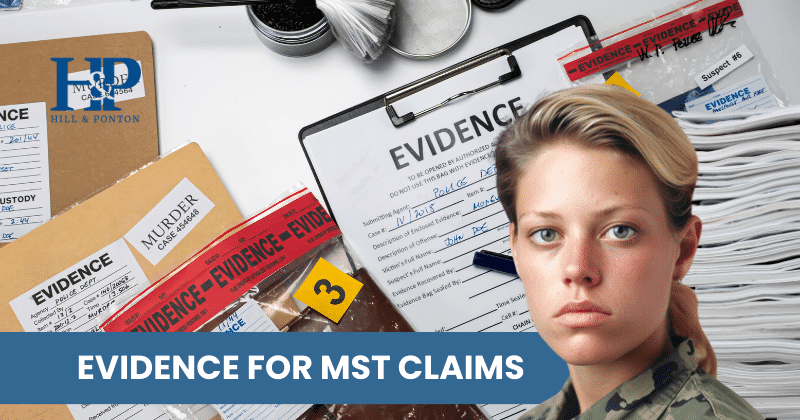When the VA reviews MST claims, they look at behavioral changes in service and following service as evidence of the traumatic incident. The VA claims process will focus on the health problems that MST survivors experience as a result of their trauma.
Medical records from clinicians are some of the most important pieces of evidence for your disability claim. There are however some difficulties with MST claims that we see over and over again in our practice:
- Lack of a formal diagnosis of PTSD as a result of MST – There are several reasons for this. Many veterans are afraid to come forward and have never disclosed the trauma to anyone, let alone a medical provider. Many have been treated at the VA for years, carrying other mental health diagnoses, but have never been diagnosed with PTSD. However, PTSD is not the only diagnosis that can result from military sexual trauma.
-
Many veterans give up because they assume that they have no claim if they have no objective proof of the event – Because MST is often underreported, there is usually no foolproof evidence that an event in service (the MST stressor) actually took place. The good news is that this is not fatal to the claim.
The VA has acknowledged the special difficulties associated with MST claims, and as such, there is a separate VA regulation governing these types of claims. The VA will allow a veteran to submit various forms of evidence (see MST markers) to help substantiate the MST claim, for example: statements from family members/fellow service members/clergy; documented tests for pregnancy or sexually transmitted diseases; episodes of depression, panic attacks, or anxiety without an identifiable cause; requests for transfer to another military duty assignment; and so forth. Foolproof evidence of the MST event is not necessary to be successful.
Winning a Military Sexual Trauma VA Claim
A veteran needs several things to successfully file a claim:
- A current mental health diagnosis by a psychologist or psychiatrist. Victim/sexual assault centers can often make referrals for veterans who are not currently receiving VA health benefits. Often times veterans do not want to use the VA Health services due to stigma or fears, so this can be a viable alternative.
- A completed application for benefits.
- A Nexus Letter. The nexus letter is a statement from the diagnosing provider that links the event of MST to the current diagnosis.
- Evidence to support the claim. This could consist of therapy treatment, medical treatment such as STD/HIV testing or SANE exam, service records that show a change in performance ratings, request for transfer, or to be relieved of duty, buddy statements that relate changes in behaviors, drug or alcohol problems (including prescription drug use), relationship difficulties, suicide attempts, hospitalizations, or other incidents that can be related to anxiety, depression, or traumatization.
Case Example: Recovering Records to Prove an MST Claim
We handled a case for a veteran who had suffered from an event involving MST caused by the actions of a superior officer in the U.S. Army. At the time of the event, the veteran, fortunately, reported the incident to the Military Police at the base.
But because it had been more than five years since the incident had occurred, the records were no longer at the military base.
(Typically, the Military Police will retain the records for a period of five years at the base location. After that, the records are sent to the U.S. Army Crime Records Center archives in Quantico, Virginia.)
It was fairly easy to request the records from the Army’s Crime Records Center (CRC). It must be sent along with a legible copy of the requester’s government issued photo ID and can be mailed or faxed to the CRC.
Their website notes that if your request is in support of a VA claim, then you will get a more rapid response if you contact your VA representative (or attorney) and have their office fax your request to 571-305-4155 (CRC Records Division).
In this instance, we requested copies of an incident providing the veteran’s name, SSN, date of birth, contact information, an approximate date of the incident and a brief description of what occurred.
We did not have the exact date or even month of the incident but only used an approximation. The veteran was very pleased to receive the results in about three weeks, and the report clearly supported his story of what had occurred.
An Attorney Shares Her Experience
Melanie Williams, a VA attorney experienced in MST claims, explains why the VA doesn’t always get it right and what you can do about it.
Overcoming an Unfavorable VA Decision
While the VA accepts many types of proof, it is often difficult to have service connection granted for MST. For instance, some veterans who experienced MST were discharged for a personality disorder or are denied benefits because of this diagnosis. In these cases, the veteran can seek to have their diagnoses changed from personality disorder to PTSD, and, in so doing, get the benefits they need. The VA will grant a VA rating for PTSD and other mental health problems.
MST claims generally have a lower approval rating than other PTSD claims; therefore, many MST claims are initially denied. Or, if the claim is approved, the percentage of disability that is granted is normally underrated, as compared to the severity of the impact of the trauma on the veteran’s life.
If your VA claim is denied or you’ve been underrated, we encourage you to appeal the decision and submit new evidence to get the health services and compensation you deserve.
Our PTSD lawyers can assess your MST claim or any related VA claims and either fight on your behalf or point you in the right direction. Get a free evaluation here.




